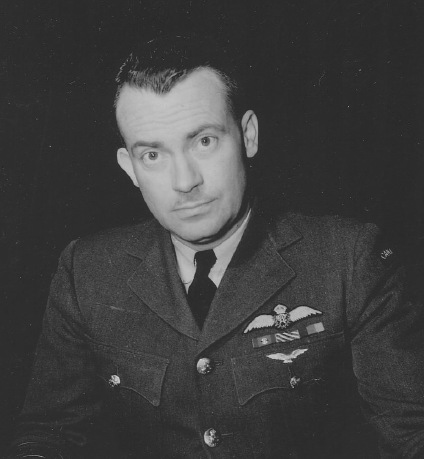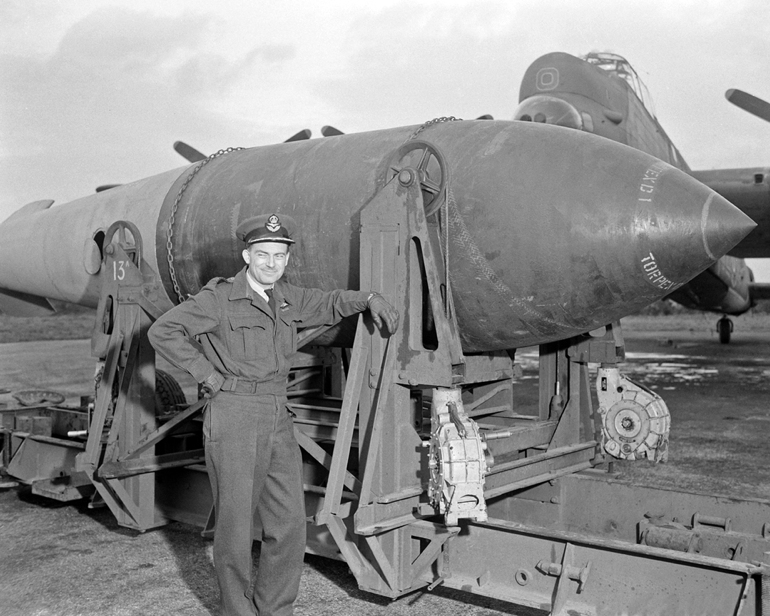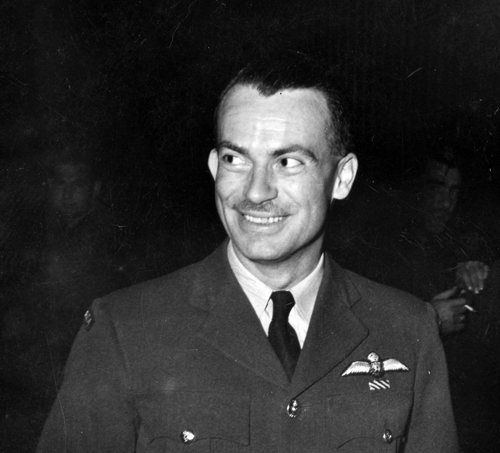 Aircrew Chronicles
Aircrew Chronicles  |
Aircrew Losses
|
Nose Art
|
BCATP
|
Lancaster
|
Media
|
Aircrew Losses
|
Nose Art
|
BCATP
|
Lancaster
|
Media
 Aircrew Chronicles
Aircrew Chronicles  |
Aircrew Losses
|
Nose Art
|
BCATP
|
Lancaster
|
Media
|
Aircrew Losses
|
Nose Art
|
BCATP
|
Lancaster
|
Media
Bomber Command Aircrew Chronicles
After attending school in Ottawa, John Fauquier moved to Montreal where he became a bond salesman but livened up his life with fast cars and motorcycles. He then joined the Montreal Light Aeroplane Club and became a pilot. Taking the decision to fly for a living, he set up Commercial Airways, operating from a lake and supporting mining exploration in northern Quebec.
|

|
By the time war broke out, Johnny was a very experienced bush pilot and he enlisted on November 1, 1939. He took the flying instructors course at Camp Borden and Trenton. After a year of instructing he was posted overseas to No. 405 Squadron where he flew Wellingtons until April, 1942 when the squadron was re-equipped with Halifaxes. By August, 1942, Fauquier had completed his first tour of 35 operations and was awarded the DFC.
Fauquier was then posted to RCAF Overseas Headquarters, then promoted to Group Captain and sent to 6Group Headquarters. On March 1, 1943, he was made commanding officer of No. 405 Squadron which, after only a few weeks, was transferred from 6Group to 8Group, the Pathfinders. Fauquier acted as Assistant Master Bomber to Group Captain John Searby on the Peenemunde Raid against the German V1 and V2 Development facilities. On August 23/24, Fauquier was Master Bomber on the opening operation of the Battle of Berlin when he coordinated the attack by 727 aircraft. He continued as C/O of No. 405 Squadron until the end of his second tour in January, 1944 and returned to 6Group Headquarters.
After hearing that Bomber Command was looking for a replacement for Willie Tait as commanding officer of the elite No. 617 Squadron, Fauquier, who was now an Air Commodore, offered to have his rank reduced to Group Captain in order to accept the position. During December, 1944, he was back on operations as the new No. 617 C/O, a position he held until the end of the war. During the last months of the war and under Fauquier's command, No. 617 employed the 22,000 lb "Grand Slam" bombs.

Regarding Johnny Fauquier, Spencer Dunmore, author of a number of fiction and non-fiction books regarding the air war and Canada's role in it, wrote the following in his highly acclaimed book, "Above and Beyond."
|
Reg Lane DSO DFC and Bar took over the command of No. 405 Squadron from Fauquier. In an interview recorded for the RCAF Memorial Museum at Trenton, Ontario, Lt. General Lane recalled, "I was with Fauquier as a flight commander for about three months. Then he left and I took over the squadron. Now Fauquier was a remarkable person, I think he had ice in his veins -that's the only way to describe him. He was as hard as nails and it didn't make any difference whether he was thinking of the enemy or getting into a fight in a pub in London, he just had no fear. He was a tough commander. He would not stand for any shortcomings in his crews. He had no compassion whatsoever. If you didn't measure up you were chewed out something fierce. Now he couldn't fire people because there was no place to fire them to, but he let it be known that he was not very pleased with your performance. But a fine man, I liked Johnny. I think the remarkable thing about Johnny was that he was a Canadian who went after 617 Squadron. Then he took 617 Squadron on some pretty horrendous raids. The man didn't know the meaning -he couldn't even spell the word fear."are as follows: |

|
Throughout the many sorties in which he has participated this officer has displayed the highest quality of courage and leadership. His ability and grim determination to inflict the maximum damage on the enemy have won the admiration of the squadron he commands. Wing Commander Fauquier took part in the two raids on Essen when a thousand of our aircraft operated each time. He is an exceptional leader.
This officer is a first-class leader whose skilful and courageous example has proved most inspiring. His sterling qualities were well illustrated during an operation against Peenemunde one night in August 1943, and again a few nights later in an attack against Berlin. Wing Commander Fauquier has displayed boundless energy and great drive and has contributed, in a large measure, to the high standard of operational efficiency of the squadron (No. 405) he commands.
This officer has commanded the squadron (No. 405) with notable success during the past nine months. He has frequently taken part in sorties against distant and well defended targets including several attacks on the German capital. He is a forceful and gallant leader whose outstanding ability and unswerving devotion to duty have been reflected in the fine operational work performed by the whole squadron. Group Captain Fauquier has set an example of the highest order.
Since assuming command of the squadron (No. 617) in December 1944, this officer has taken part in almost all the sorties to which the formation has been committed. Early in February 1945, Group Captain Fauquier led the squadron in an attack on the U-Boat pens at Poortershaven. Photographs obtained showed that the bombing was accurate and concentrated. Since then, this officer has participated in a number of sorties during which the railway viaduct at Bielefeld, a railway bridge over the river Weser and a viaduct over a flooded meadow near to Ardbergen bridge were all rendered unusable by the enemy. By his brilliant leadership, undoubted skill and iron determination, this officer played a good part in the successes obtained. He has rendered much loyal and valuable service.